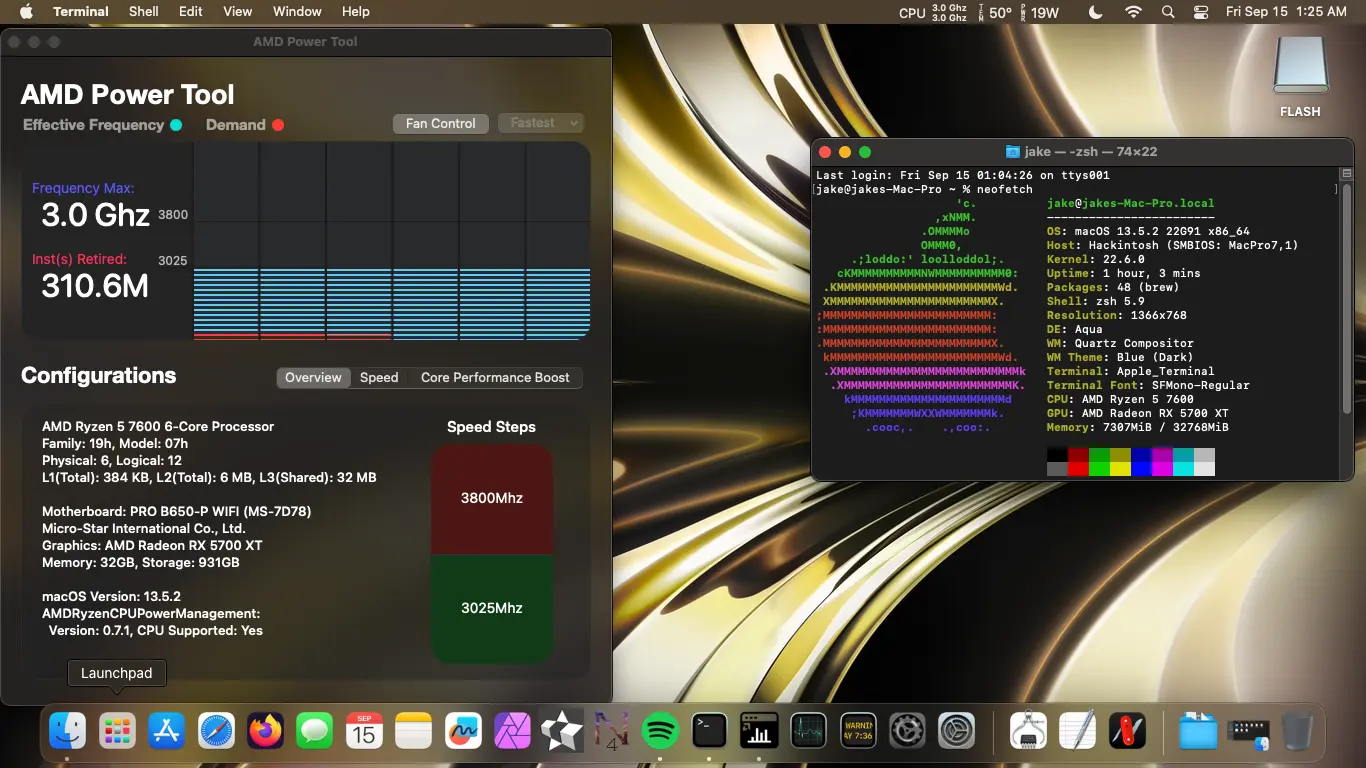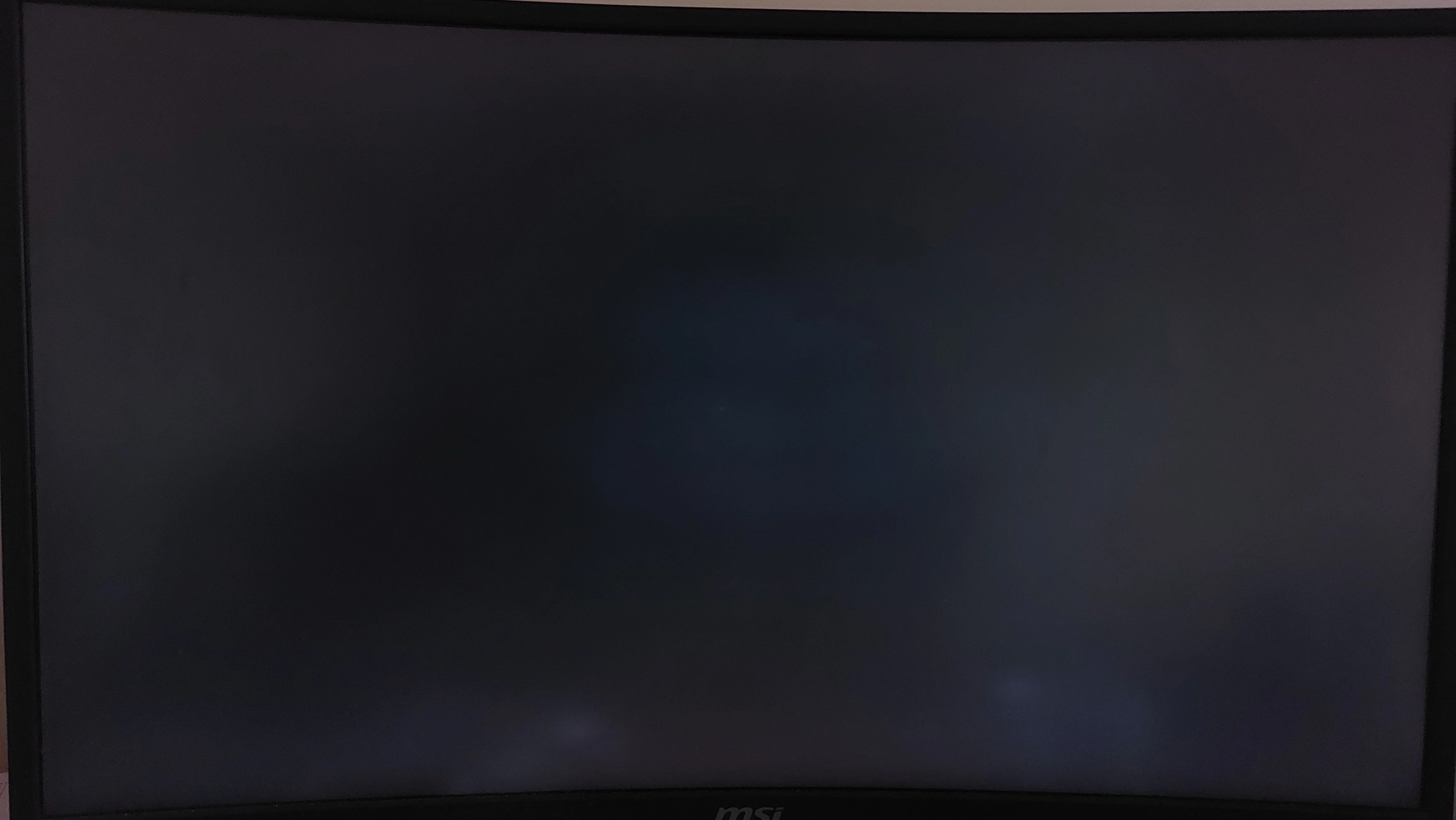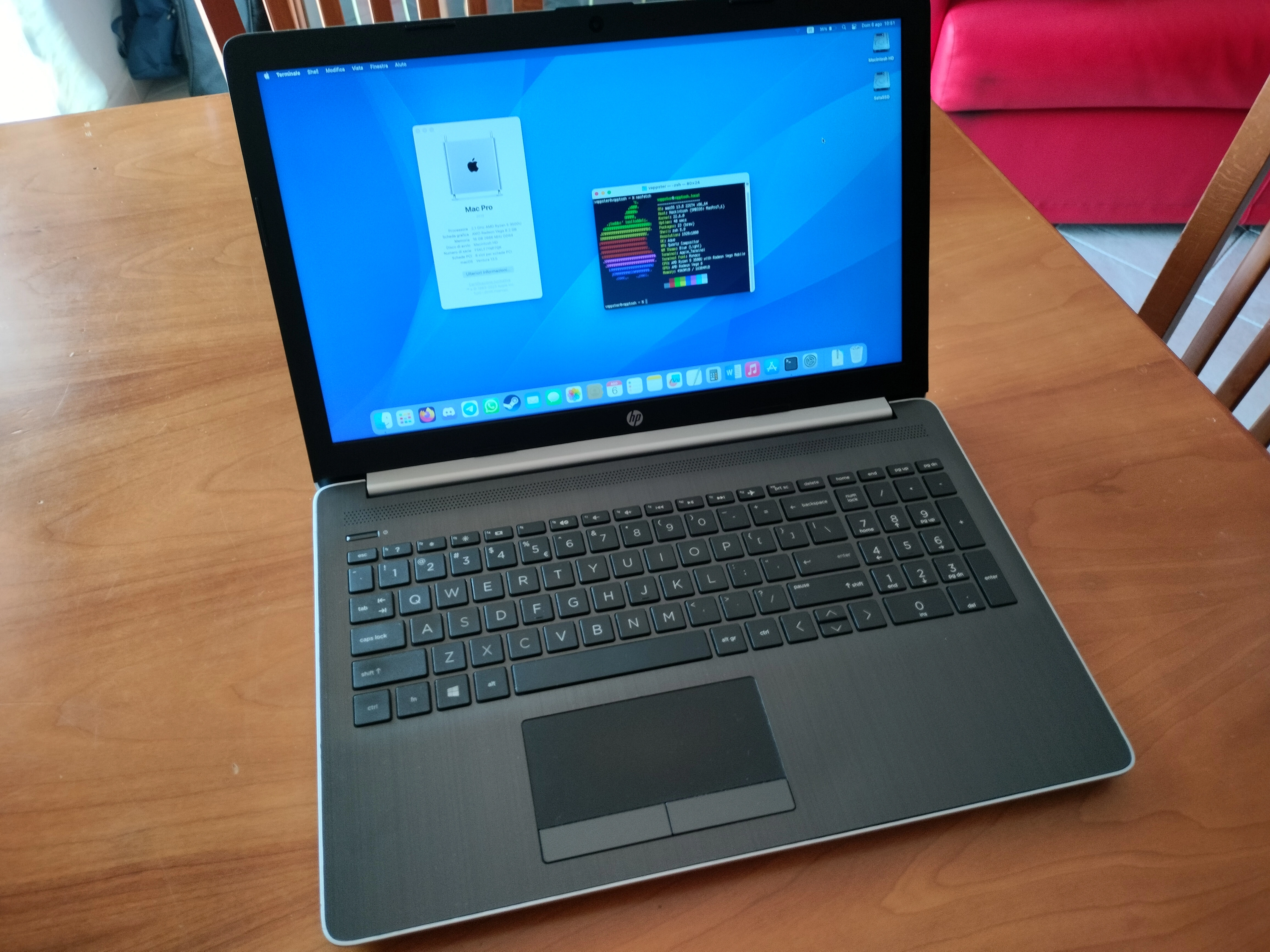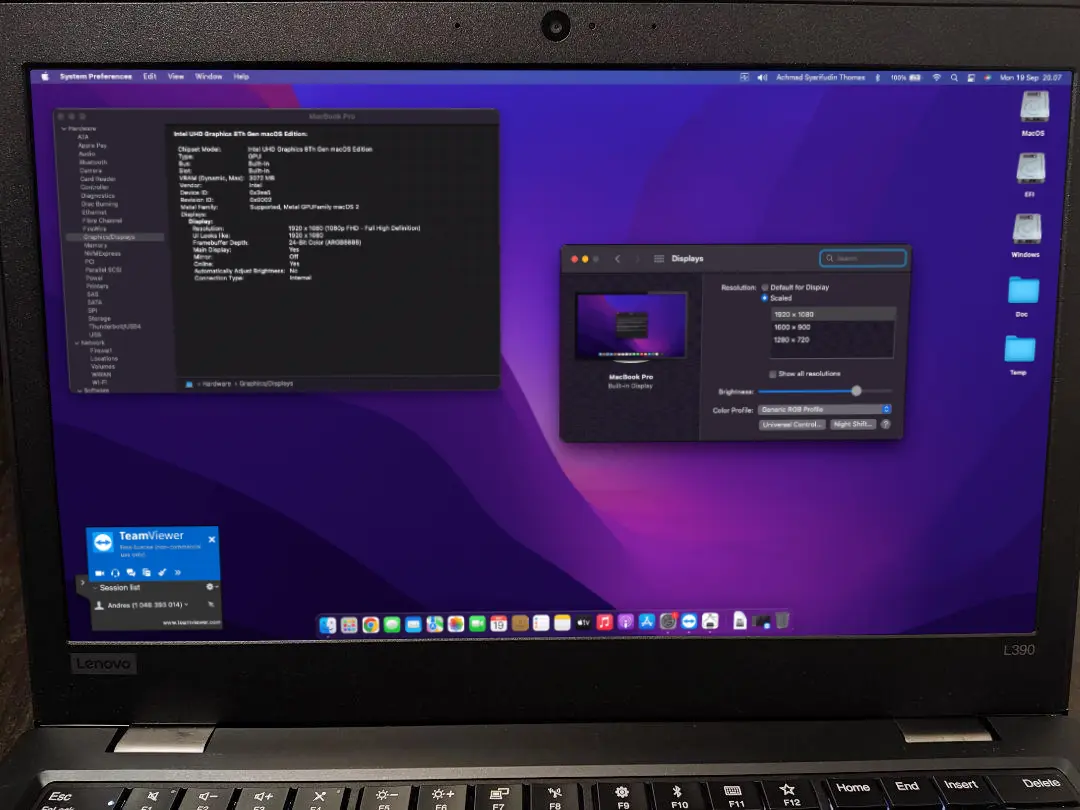
-
OSX-KVM single GPU passthrough
I am trying to set up a way to use my Linux normally and then on demand fire up an OSX VM with GPU passthrough.
Arch Linux Gigabyte RX6600xt macos 13 Ventura VM
I've been fucking around with it for two days, getting a bit further each time, but now I am stuck.
I can boot up the vm just fine with OpenCore-Boot.sh
Here is my script:
https://pastebin.com/McyHyMk4
What I see, the screen goes black, then I see the TianoCore boot logo, then some errors and nothing more happens. https://imgur.com/JdTkXG2
I ran info pci via telnet and it showed the GPU.
I have agdpmod=pikera in the config.plist and rebuilt the OpenCore.qcow2 according to the official instructions.
When I add a vnc option and vnc into it from another computer, I can see the proper boot menu and select an entry and boot into macos. It even seems to recognize an AMD gpu, but not fully.
Please tell me any debugging / info providing steps, as I am quite new to this.
Thank you very much for your time and effort.
-
If I add more RAM, will I have to remap memory addresses?
Hey folks,
I've got a completely working, stable Ventura install on my AMD Ryzen 5, AM5 build. I built this PC back in September 2023, but at the time I only had enough funds for 32GB of DDR5.
I had to go through this section of the Dortania guide extensively when I was first setting things up:
https://dortania.github.io/OpenCore-Post-Install/universal/memory.html#mapping-our-memory
If I were to add more RAM, would I need to go back through that entire section of the guide again? I'm assuming adding more RAM would affect my current memory map, correct?
-
Apple MacBook SSDs
I've picked up an old MacBook air 2013 from trash without battery and ssd. I want to see if I can bring it back to life. Apparently Apple does not use standard SSD. Do you know about any adapters in the market that would make it possible to use a standard SSD? I don't want to spend money on non standard SSDs that works only on macs. I don't even know if it work even at this point.
-
I made a prebuilt EFI for ASUS ZenBook 13 computers.
Check it out: https://github.com/Octopus1348/ASUS-Zenbook-13-Hackintosh
And if you find any issue that is not documented in the README, open an issue, or if you find a solution to one of your (or a listed) problem, don't forget to make a pull request! If you're skeptical if it will work on your specific computer or not, remember that I modified an EFI originally meant for Infinix Inkbook devices, the only thing that may need manual fixing for is the audio.
-
Update: AMD Ryzen 5 7600 + B650-P Mobo


Wanted to post an update as this thing is much more usable now:
Running on Opencore 0.9.3 CPU: AMD Ryzen 5 7600 GPU: AMD Radeon 5700XT Sapphire Nitro+ RAM: Teamgroup Elite DDR5 2x16GB 4800MHz Motherboard/Laptop Make and Model: MSI Pro Series B650-P Audio Codec: ALC897 Layout=99 via AppleALC (incorrect layout but it's good enough for now) Ethernet Card: RTL8125 2.5Gbe Wifi/BT Card: Fenvi 1200M / BCM4360 BIOS revision: Mac Pro 7,1 Guide Used: Dortania
What's working: Wifi, Sleep, Quartz Extreme, Audio line out & HDMI out, onboard APU (VESA only), all but one USB Port
Whart isn't working: Bluetooth (need to remap USB ports but it's not a huge priority), NVRAM (Mobo NVRAM not natively supported and I couldn't even get emulated NVRAM to work. Dortania's guide isn't updated for OC 0.9.3 and his guide as it currently exists runs me into a dead end. Open to suggestions on fixing this! )
Any changes that were specific to your build that were a little (or a lot) different than what you found in the guide: Oh my god tons.
-
The B650-P is an absolute pig with the way it maps both memory and ACPI. In order to get it to even boot at all, DevirtualizeMMIO is a must. You will also need to generate memmap.txt to determine your KASLR slide value - They have a bot on the Hackintosh Discord that helps a lot with this. You will additionally need to create an MMIOWhiteList. Set EnableWriteUnprotector-> True, RebuildAppleMemoryMap -> True, SyncRunTimPermissions->Tue. All of this must be done to get reliable booting!
-
As for the Sapphire Nitro+ Radeon 5700XT - do yourself a favor: Take your WhateverGreen kext and throw it in the trash bin. It wasn't needed for the particular vBios that came on this card. Before I did that I always got a black screen no matter what boot-args I used. I booted without WEG and without any flags and it worked flawlessly. The dev for WEG can't seem to code for a debug log even though he claims WEG-dbg and Lilu-dbg kexts are capable of it. My advice is to generally run far away from any kexts that can't produce a debug log if you're trying to do a Ryzentosh without pulling your hair out.
-
The audio was a chore. You will need to add the ALC897 PCI info to DeviceProperties using Hackintool before AppleALC has a chance of recognizing it.
-
Onboard Mediatek wifi is unsupported but getting the addon 1200M to work was a breeze sans Bluetooth. Highly recommend this card.
This is my first Hackintosh in 15 years - first ever AMD hack and I believe I may be one of the first to get a hack running on the B650-P hardware. This build took me about a month. I intend to use it for post-processing on my astrophotography images, among other things. It is rock-solid stable and even under stress tests the 5700XT performs well with no graphics crashing.
-
-
Gradient on boot to install media


Hi everyone. I recently followed the guide to create an EFI for my hackintosh system using the dortania guide.
On boot of the install media, all I get is a gradient on the monitor and nothing more, no mouse pointer etc.. It is able to boot into the install media successfully, but all I get is a gradient on my screen.
I have supplied an image and my EFI files are here (password: Hackintosh356:): https://use05.thegood.cloud/s/JKT2rLxmpkqKC66?path=%2F
The strange thing is, a few weeks ago, with the same EFI and hardware, I was able to install MacOS Ventura successfully and use it for two weeks, maybe I changed something? I have no idea. (I've already tried to run my config.plist through an online checker, after fixing some issues the same thing happens on boot to the install media)
These are my specs:
AMD Ryzen 7 2700x (8c/16t)
Sapphire RX 580 8GB
16GB RAM
Asrock B450M-HDV r4.0
Network cards: Realtek RTL8111H Intel E1000e
Audio Codec: Realtek ALC887/897
[EDIT]: Wow I am so stupid lol, I had a second monitor that was turned off plugged into my GPU, and the MacOS installer was displaying on that, I unplugged the second monitor and everything works again LOL.
-
Ryzen 5 7600 + B650-P running MacOS Ventura


I'm happy to report MacOS on 5th gen Ryzen5 is definitely doable. This is my first Hackintosh in 15 years - decided to try on a brand new AMD DDR5 system with Ryzen 5. Graphics are running on RDNAX iGPU with NootedRed.
Just got this installed, stable, and booting last night. Still lots of work to do:
- No graphics acceleration: I will be buying a compatible dGPU shortly. Not sure if NootedRed will support GA on AMD APU with RDNA, and really don't want to find out for stability reasons. Chefs kiss explicitly states RDNA APUs are currently not supported
- No wifi: purchasing a compatible wifi adapter shortly
- No sound: will need to patch AppleALC
- All USB ports working without having to do anything
- Sleep untested
MUSTS for the B-650 system!!!!:
- EnableWriteUnprotector -> False
- RebuildAppleMemoryMap -> True
- SyncRuntimePermissions -> True
- Enable DevirtualizeMMIO and set KASLR slides per Dortania. Prevents the [EB] #LOG: EXITBS:START error in Opencore
- Enable MMIOWhitelist and copy hexadecimal MMIO deviart addresses from Opencore logs. Prevents Kernel Panics for Invalid Frame Pointers on both shutdown and halfway through installation process (the latter does not log an error! You will just see the installer lock up). See Dortania troubleshooting guide
I haven't seen any specific guides or posts for the B650-P Chipsets yet. I believe I may have been one of the first to accomplish a stable running example. I can send my Config.plist as a reference for anyone else attempting a Hackintosh on this platform. This installation is rock solid & stable with no KP's.
-
HP 15-db1061nw (Ryzen 5 3500U) running Ventura 13.5 + Experimental Ryzen APU XHCI kext fix


- CPU: AMD Ryzen 5 3500U
- GPU: Vega 8 (iGPU)
- RAM: 16 GB DDR4 (overclocked to 2666 MHz via Smokeless UMAF)
- Laptop model name: HP 15-db1061nw
- Audio Codec: Realtek ALC236
- Ethernet: Realtek PCI GbE
- Wi-Fi/BT card: Realtek RTL8821CE (Not supported, I've mounted an USB Archer T2U Nano internally - more info in the description)
- Touchpad: Synaptics touchpad (PS/2)
- Keyboard: Integrated (USB)
- NVMe SSD: WDC PC SN530 SDBPNPZ-512G-1006
- SATA SSD: Samsung 860 EVO
(I'm using a MacPro7,1 SMBIOS as it was the only way I could get iServices to work)
This is a laptop I have gotten in Poland as I needed a machine for an apprenticeship there, and it's very likely the last hackintosh I ever make: I'm planning to stick by this one for as long as I can and, once becomes too old to be useful, I will buy an Apple Silicon based Mac if I want to run macOS.
iGPU aside (seriously impressive stuff by the NootInc team!), the tricky parts to get this hackintosh laptop to work were the Wi-Fi/BT card and USB. The stock Wi-Fi card is unsupported by macOS and, while I could've bought and installed a supported M.2 model, I've decided to use a compatible USB one I had lying around from a previous project instead and mount it internally, connecting it to the laptop's internal antenna so I can still get good reception. I know it's not ideal, but I'm okay with not having AirDrop and I can always get a proper compatible card down the line if I change my mind, so why not?
Then, there's the USB issue. Oh boy. If you're not up to speed, some Ryzen APU-based hackintoshes hang on boot when XHC0 & XHC1 get initialized due to a not yet fully understood issue. You can work around this either by disabling one of the two controllers using Smokeless UMAF (but that means losing some external/internal ports, plus some laptops don't have that option in UMAF... like this one) or use GenericUSBXHCI, which will allow you to boot into the OS, however most of its functions are broken under 11.0+ (no USB mass storage, and most USB devices that aren't mice/keyboards won't work).
Therefore, because I couldn't use the UMAF workaround, I was stuck with a laptop with next to no USB support in macOS up until I decided to screw around with GenericUSBXHCI during some downtime at work, and I've managed to make USB work properly on my machine! The result is this experimental kext - make sure to read the readme if you're planning to test it out on your hackintosh, neither I nor the guys I talked to at Noot Inc. are sure what exactly is making it work so far so it's not a proper fix just yet. (But if you are affected by the USB issues and do end up trying it, let me know if it worked for you!)
-
Installing Ventura in a USB drive
I'm hitting a roadblock here.
I've tried to install MacOS Ventura 13.4.1 (currently latest) into a Kaby Lake laptop, but not into the hard disk but rather the same USB drive (not an SSD, just your average USB 3.0 stick).
The installer runs fine, and I can even use Disk Utility to re-partition the drive into a GUID and create an APFS volume to install Ventura. The installer does the install, it takes a while given the USB speeds, and the system restarts a couple of times - OpenCore runs fine and shows the volume so it can continue the installation - but after the third restart, just before showing the first stup screen, the system throws a kernel panic.
The
watchdogstates thatopendirectoryddidn't respond after a few seconds.Some users also report the same problem when trying to run Ventura from an USB stick, which is resolved by just installing it to the internal SSD or using an SSD/NVMe enclosure connected to USB.
-
Hackintosh T490 Questions
I am planning on purchasing a T490 with the intention of installing Ventura on it as there is quite a few issues with my current Thinkpad and it's time for an upgrade.
I am glad to see that there is a few GitHub repos for it but I am wondering if there is anything I am overlooking before planning to purchase it and possibly upgrade some components. I am quite new to hackintosh builds having only ever done one before, for a friend.
Do you think I would have issues if I upgraded the display to or bought one with a WQHD display (2560x1440)?
Am I right to opt for the model without dedicated Nvidia graphics?
Am I okay to believe all the T490 I7 processors compatible?
From what I read I would have to replace the Samsung NVMe M.2 as its not supported, that's OK.
I am thinking 16-32GB of RAM, budget dependent.
I would appreciate any input, suggestions or recommendations before pulling the trigger.



